Talent intelligence is the leveraging of AI-driven data collection and analysis to provide organizations with a comprehensive understanding of internal and external talent. This approach empowers HR leaders to evaluate potential candidates, identify skill sets within their workforce and industry, and anticipate future skill requirements. By integrating talent intelligence into their strategies, organizations can strategically align workforce planning with business objectives, fostering a goal-oriented mindset that drives long-term success.
- Despite 72% of organizations increasing investment in talent intelligence, only a minority fully understand its scope and know the different providers.
- Talent intelligence is essential for aligning employer and employee needs amid evolving work dynamics and retention challenges.
- A clear need exists for articulating talent intelligence, emphasizing the necessity of precise definitions and targeted education in HR.
In the fast-paced world of HR, talent intelligence is shifting how we do everything. But despite 72% of companies ramping up investments in talent intelligence, only a fraction truly grasp its scope, function, and purpose.
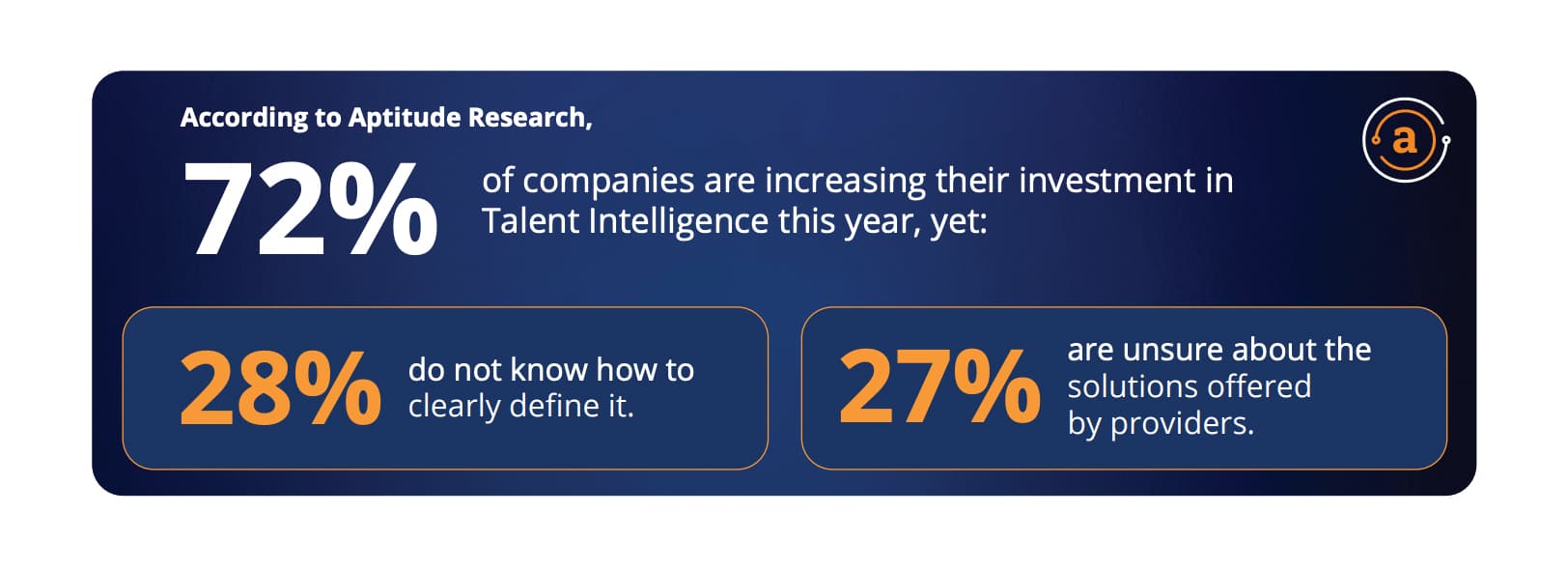
Source: Aptitude Research
I recently had the chance to speak with Madeline Laurano, an analyst at Aptitude Research, about the impact of talent intelligence across industries. You can watch the full webinar or read on for key takeaways, including what talent intelligence is, its key benefits, and how to start building a skills-based organization.
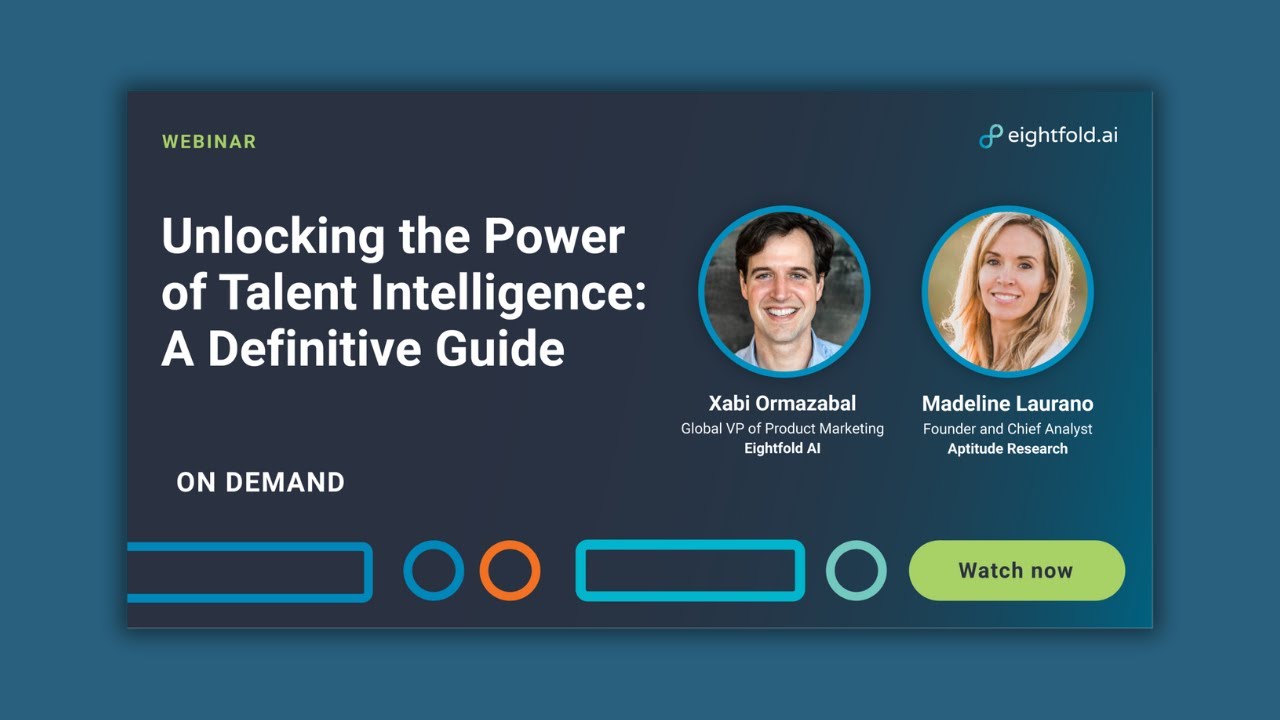
Related content: Watch our on-demand webinar with Aptitude Research analyst Madeline Laurano discussing talent intelligence, based on her latest report, Demystifying talent intelligence: Unlocking the potential with skills & AI.
What is talent intelligence?
It’s no secret that talent intelligence is one of the fastest-growing areas in HR technology and for good reason. According to Aptitude Research, the majority (62%) of organizations have eliminated, or plan to eliminate, roles this year. Another 65% have identified skill gaps, and 90% have created new roles.
Rapid change and disruption are pushing organizations to rely on skills like never before to better manage talent and make strategic decisions about talent more effectively. To quantify and understand skills, their leaders are turning to talent intelligence.
But what exactly is talent intelligence?
First, let’s start with what talent intelligence is not. As Laurano said, “It is not an ATS. It’s not a standalone recruitment solution. It’s not an LMS. It’s not your system of record. This is a platform that uses AI to provide skills-based insights that serve as the cornerstone of your talent acquisition, talent management, and strategic workforce planning strategy.”
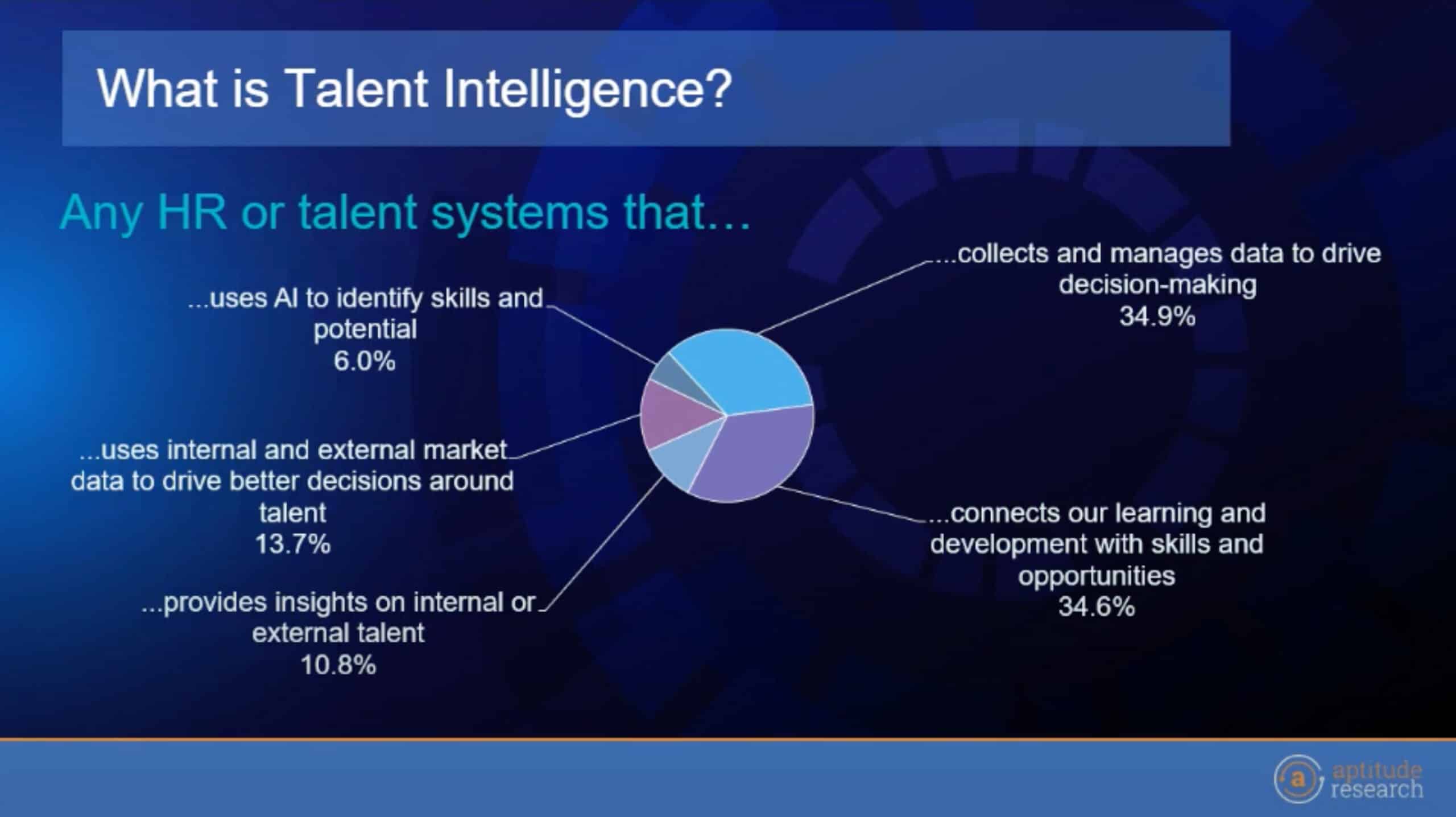
What is talent intelligence? Source: Aptitude Research
Talent intelligence uses AI to turn data into insights that inform every piece of the talent life cycle. It can show organizational leaders skills trends in their workforces and competitors’ workforces so they can make cost-effective plans to acquire the right skills. It also gives employees a powerful and equitable way to be seen, developed, and promoted.
Far from being a mere data-management tool, talent intelligence is a strategic blend of AI and skills analysis that helps drive impactful business results in HR and the business.
Benefits and impact of talent intelligence
What we’ve typically observed when organizations turn on talent intelligence is that candidates and employees greatly underestimate their skills. For instance, they might put that they have five skills or so on their résumés or in a simple intake process. When you look at their skills through the lens of talent intelligence, we might be able to infer about a dozen more skills, then identify 15 additional adjacent or learnable skills on top of that.
So we go from a footprint of just five skills to about 32. This touches on the biggest benefit of talent intelligence — the real-time understanding of skills.
The ability to use AI to extract all those skills-based insights and understand an employee’s or candidate’s potential is the cornerstone of talent intelligence and what makes it so valuable. These real-time, skills-based insights have ripple effects across hiring, management, and workforce planning. Recruiters can exponentially widen the talent pool, promotions happen based on merit, and workforce planning becomes a matter of strategic skills acquisition.
There’s also the upside that talent intelligence is transparent and explainable. When you’re able to use technology to tell candidates exactly why they’re a fit for a specific project or role, it gives them the confidence to apply. Talent intelligence also reduces bias in hiring and promotions, leading to fairer and more equitable workplaces.
Talent intelligence can even be used for performance management. As Laurano said during our discussion, performance management is typically dictated from manager to direct report. It’s not collaborative. In a skills-based approach, there is ongoing collaboration in that employees can see where they want to go in the organization and what skills they’ll need to get there, and then they can work with their manager to acquire those skills and reach those career goals.
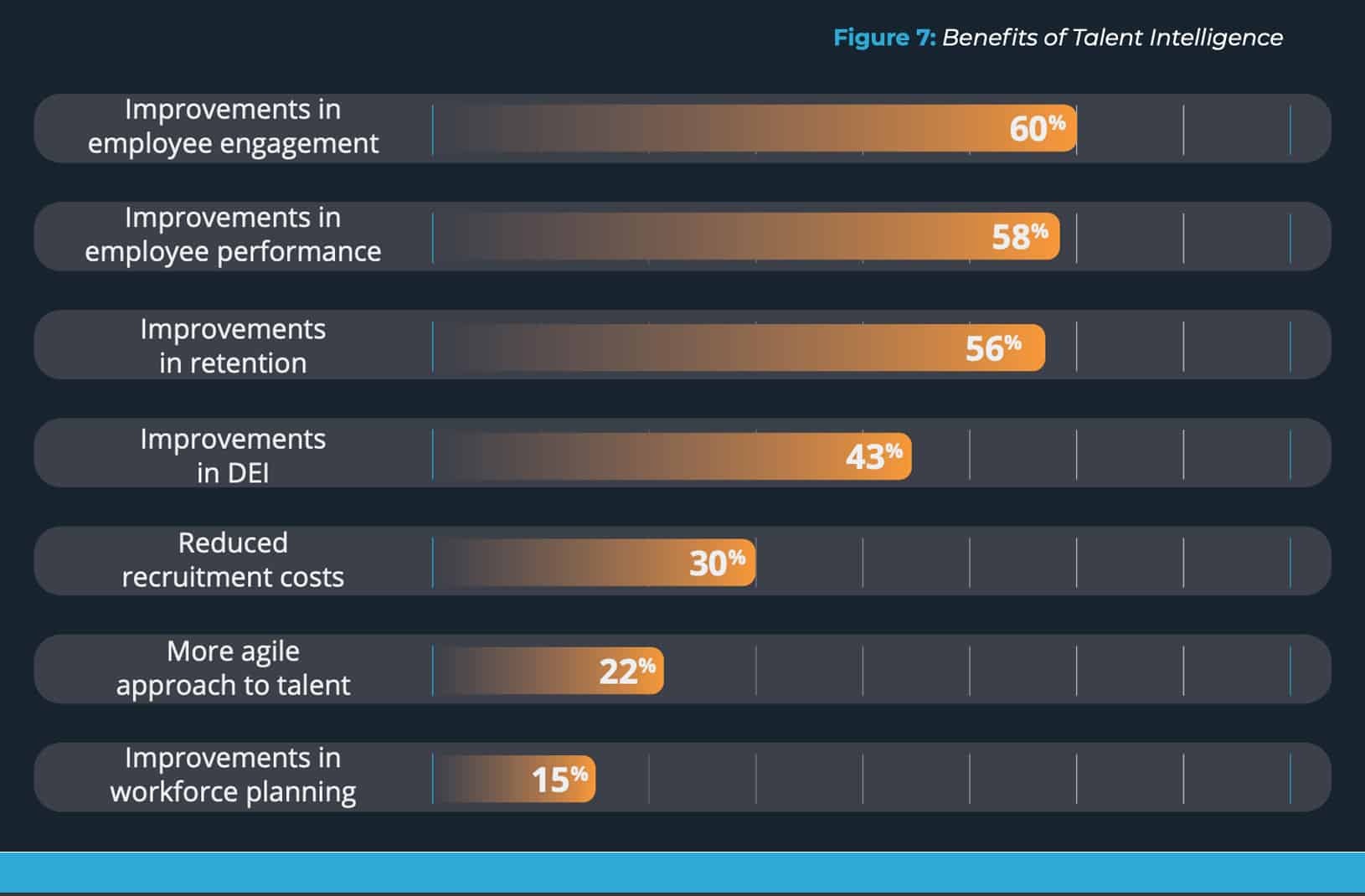
The impact on business outcomes is significant. With 60% of businesses reporting improved employee engagement, 58% seeing enhanced employee performance, and 56% experiencing better retention rates, the value of talent intelligence extends beyond HR processes to overall organizational health. Source: Aptitude Research
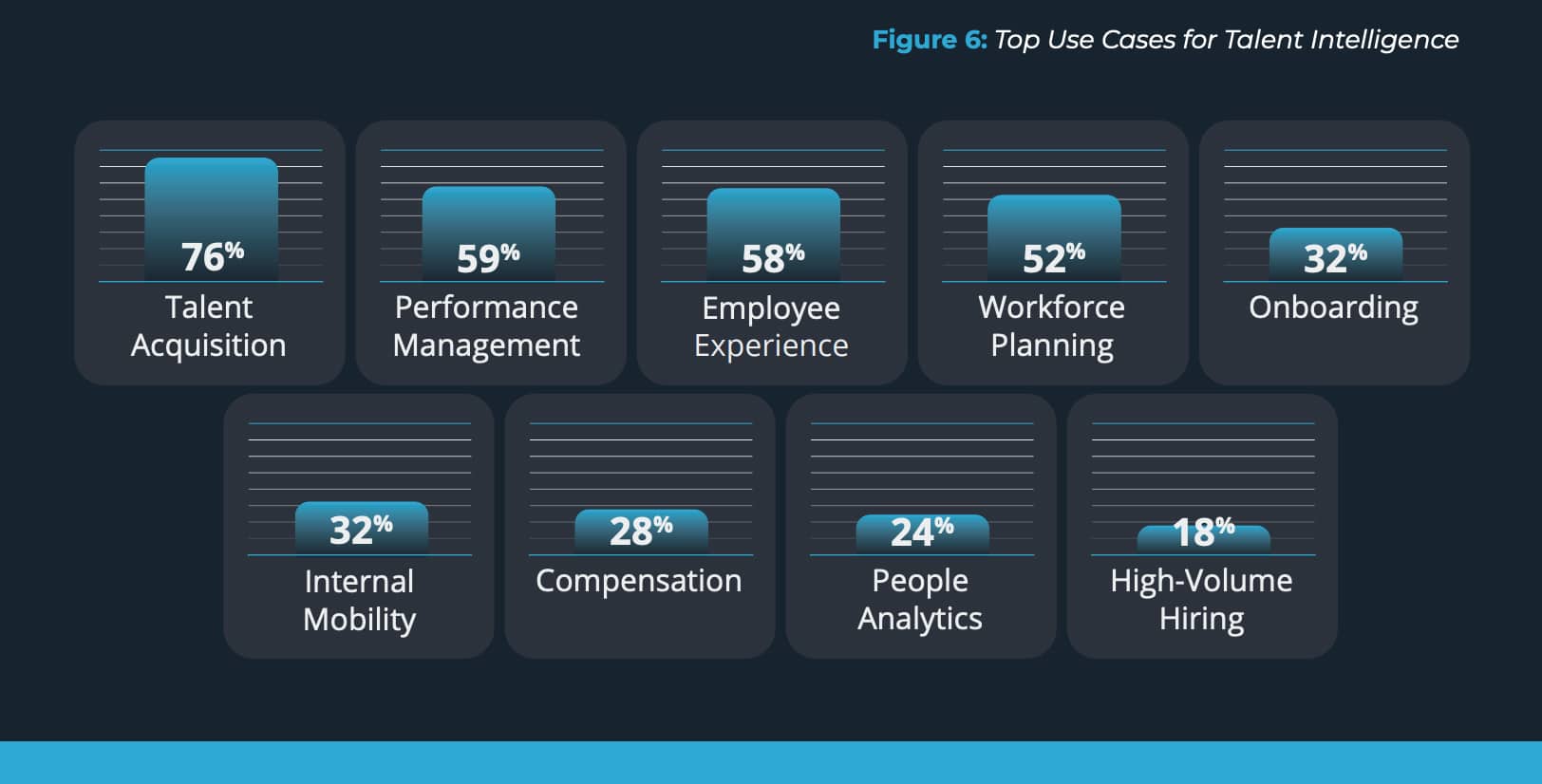
Top use cases for talent intelligence. Source: Aptitude Research
Talent intelligence’s versatility is evident across multiple HR functions:
- Talent acquisition (76%): Refining recruitment for optimal candidate-job alignment
- Performance management (59%): Elevating employee assessment and development
- Employee experience (58%): Enhancing satisfaction, engagement, and overall experience.
- Workforce planning (52%): Assisting in strategic resource allocation
- Onboarding and internal mobility (32% each): Facilitating smoother career transitions
- Compensation (28%): Ensuring competitive salary structures
- People analytics (24%): Providing strategic HR insights
- High-volume hiring (18%): Streamlining recruitment for large-scale hiring
A shift in AI sentiment: Making HR more human
Integrating talent intelligence into existing HR systems is transforming how we understand and manage talent. AI is pivotal in this transformation. “Companies are maturing in their adoption and interest in AI, moving from fear to seeing its value,” Laurano said.
This shift is significant, with 69% of organizations now increasing investment in AI for talent acquisition. AI’s role extends beyond mere data analysis — it provides contextual insights about individuals and employers, dynamically tailoring skills management.
However, AI’s integration into HR is about more than just efficiency. It’s about enhancing the human element in talent management. AI is now seen as an extension of the team, enhancing how HR and recruiters do their jobs, not replacing them.
This sentiment is echoed by many, with 80% of companies still placing human judgment at the center of talent decisions, supported rather than supplanted by AI. This collaboration between AI and human intuition leads to a more talent-centric approach, empowering HR professionals with deeper insights and more informed decision-making capabilities.
In a landscape where AI is often misunderstood, its ethical application in HR is key. “We’re seeing a shift toward ethical AI, which can actually reduce bias,” Laurano said, highlighting an essential aspect of AI’s role in HR — its potential to create fairer, more inclusive workplaces. This responsible application of AI in talent intelligence ensures that talent acquisition and management are objective, data-driven, and, ultimately, more human.
Setting the record straight on systems of records
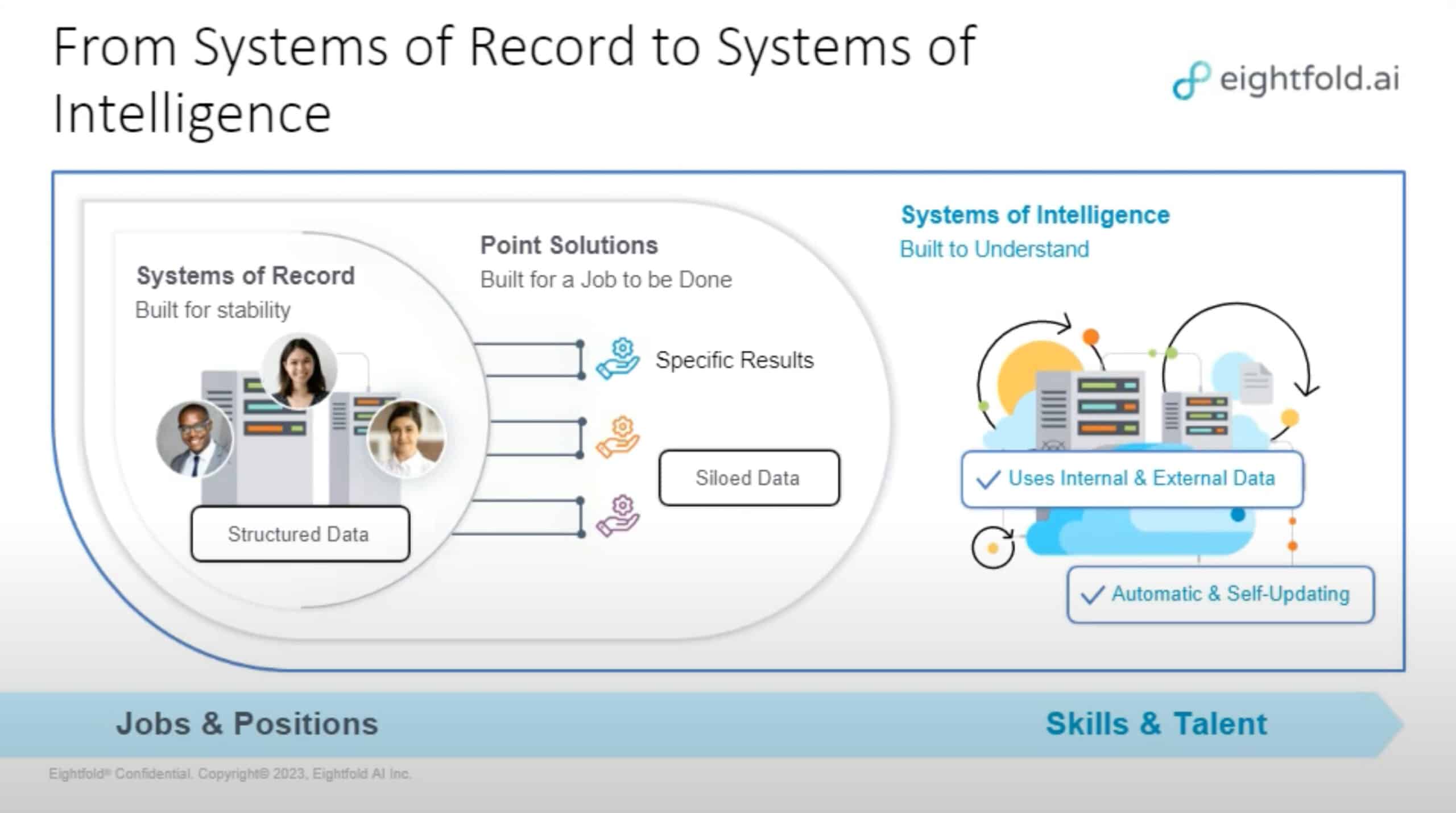
The transformation within HR technology reflects a significant shift from traditional systems of record to advanced systems of intelligence. It’s not an either-or equation — it’s a both-and. While traditional HR systems efficiently store structured data, including employee details and compensation, systems of intelligence integrate and constantly update a wide range of data, providing a holistic, dynamic, and up-to-date view of talent across the entire organization.
The system of intelligence is an additional layer of insights that sits on top of your system of record. This enhancement is pivotal in addressing the evolving challenges in the workplace. It allows organizations to not only maintain essential data but also derive insightful, actionable intelligence, paving the way for strategic talent management and a more dynamic HR function.
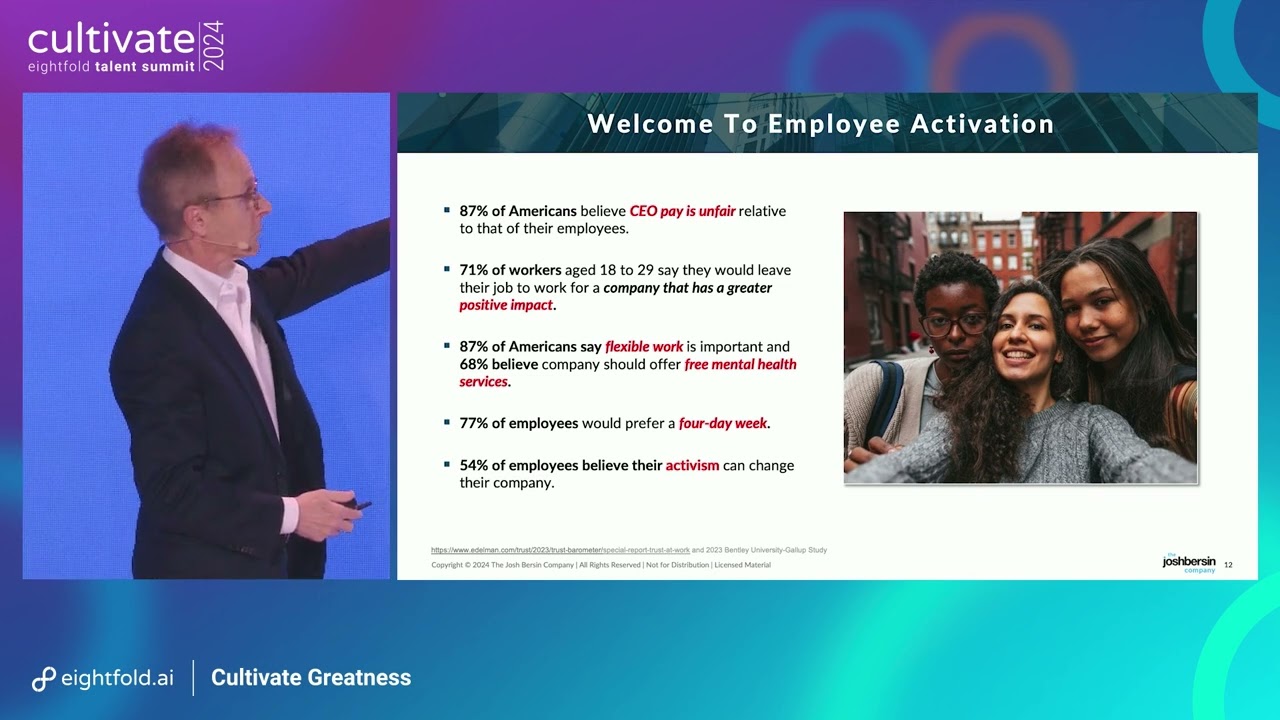
Related content: Josh Bersin, Global Industry Analyst, will unveil a new model for talent intelligence, showing HR and business leaders how AI has evolved and how the entire world of HR Technology will change again.
Unlocking the power of talent intelligence in HR
Moving past widespread misconceptions, it’s crucial to understand talent intelligence and its impact on HR. The key to unlocking its potential lies in setting precise objectives. Remember, talent intelligence isn’t just for recruiting — it’s for every facet of HR.
But don’t try to implement talent intelligence everywhere all at once. Start small in your biggest area of need. Then, over time, your organization will transform, and you’ll be leading your HR strategy through skills-based insights.
For a comprehensive exploration of talent intelligence and how it can strengthen your organization heading into the new year, I encourage you to watch the webinar or read the report from Aptitude Research for the insights and practical guidance you’ll need to navigate the talent intelligence landscape and ensure that your organization has the skills it needs to stay ahead for years to come.
Xabier Ormazabal is Global Vice President of Product Marketing at Eightfold AI.












